2019年春外研版高中英语必修四Module 5 A Trip Along the Three Gorges gramma课件 (52张ppt)
文档属性
| 名称 | 2019年春外研版高中英语必修四Module 5 A Trip Along the Three Gorges gramma课件 (52张ppt) | 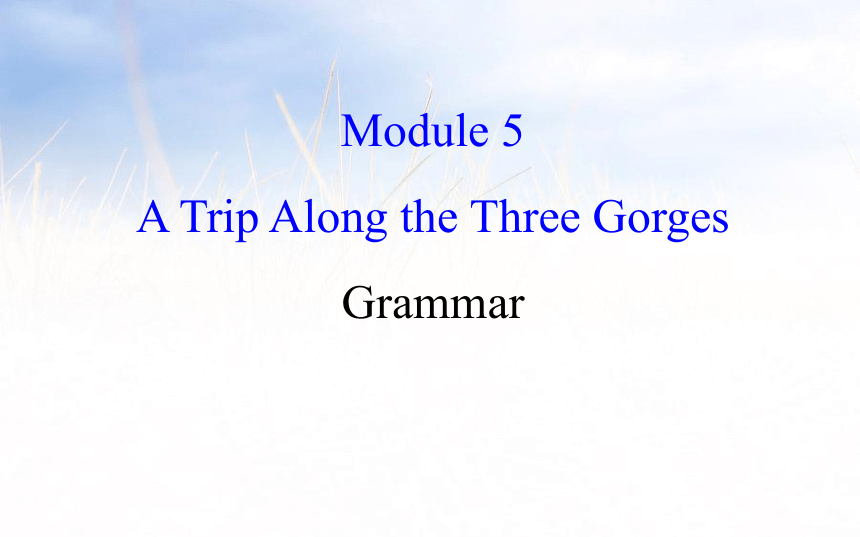 | |
| 格式 | zip | ||
| 文件大小 | 562.9KB | ||
| 资源类型 | 教案 | ||
| 版本资源 | 外研版 | ||
| 科目 | 英语 | ||
| 更新时间 | 2019-04-19 08:10:16 | ||
图片预览

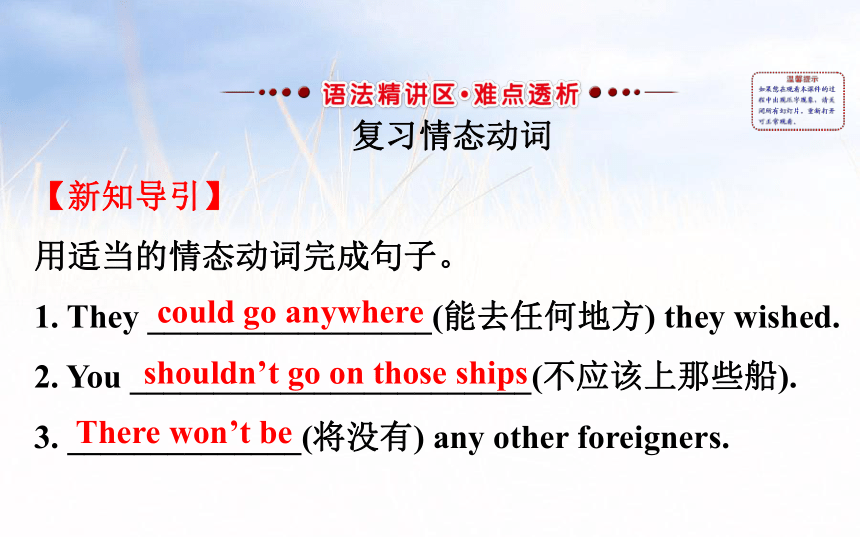




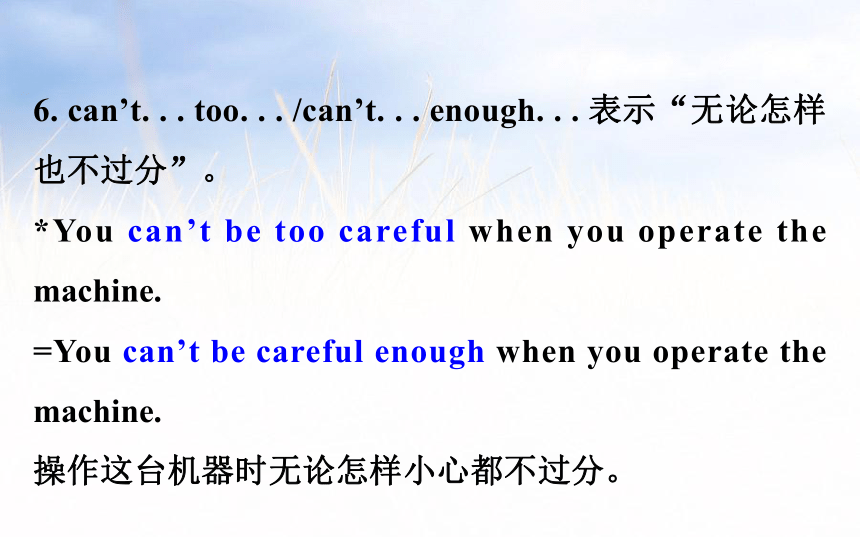
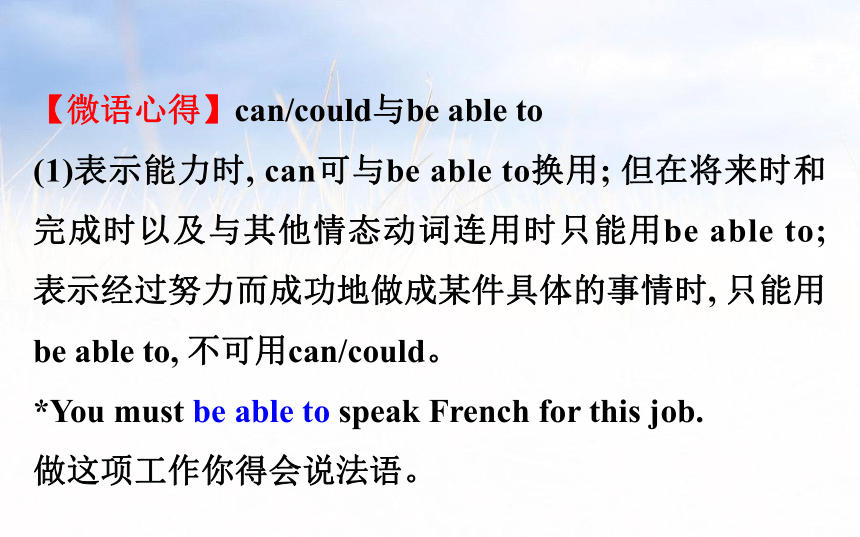


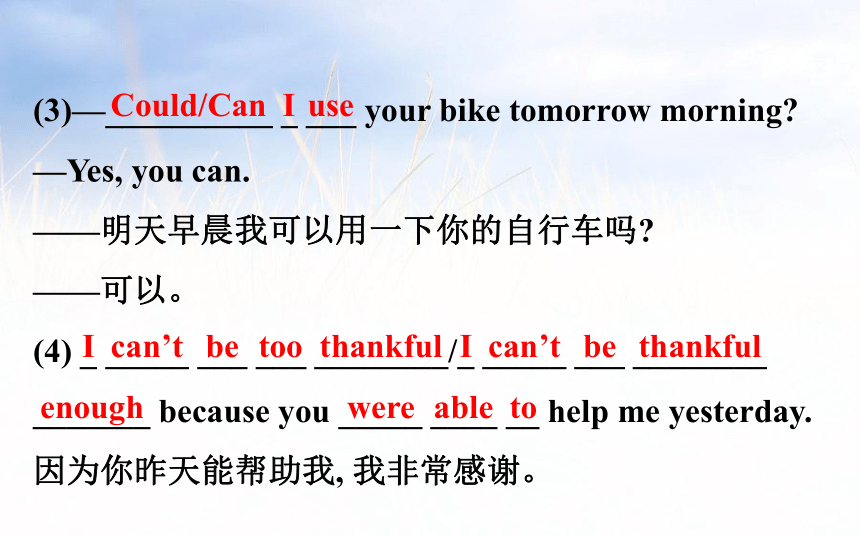
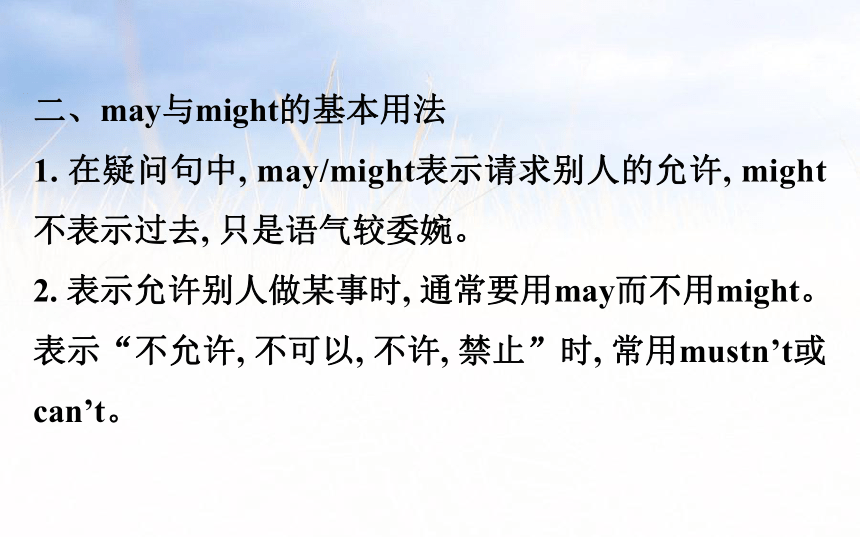
文档简介
课件52张PPT。Module 5
A Trip Along the Three Gorges
Grammar 复习情态动词
【新知导引】
用适当的情态动词完成句子。
1. They _________________(能去任何地方) they wished.
2. You ________________________(不应该上那些船).
3. ______________(将没有) any other foreigners. could go anywhereshouldn’t go on those shipsThere won’t be【要义详析】
情态动词表示说话人的语气和情绪, 不能单独作谓语, 后面必须与动词原形一起构成谓语。情态动词没有人称和数的变化, 但有的情态动词有过去式。常用的情态动词有: can, could, may, might, must, shall, should, will, would; 其他的还有ought to, need, dare等。一、can与could的基本用法
1. can表示能力, 意为“能, 会, 能够”; could表示过去的能力, 是can的过去式。
2. 在疑问句中can/could表示请求, could不表示过去, 语气较委婉。在回答中, 用can/can’t, 不用could。
3. can在陈述句中可表示允许, 口语中常代替may。can’t表示“不允许, 禁止”。4. can表示推测, 意为“可能, 会”, 用在否定句和疑问句中。can’t表示否定推测, 意为“不可能, 一定不”。
5. can表示“有时也会”, 用以描述特有的行为或情形。
*Can I go with you? 我能跟你一起走吗? (请求)*Father said I could go to the cinema.
爸爸说我可以去看电影。(表示过去的许可)
*Could I ask you something?
我可以问你一件事吗? (请求, 用could比can更委婉)
*He can’t be at home. 他不可能在家。(否定推测)6. can’t. . . too. . . /can’t. . . enough. . . 表示“无论怎样也不过分”。
*You can’t be too careful when you operate the machine.
=You can’t be careful enough when you operate the machine.
操作这台机器时无论怎样小心都不过分。【微语心得】can/could与be able to
(1)表示能力时, can可与be able to换用; 但在将来时和完成时以及与其他情态动词连用时只能用be able to; 表示经过努力而成功地做成某件具体的事情时, 只能用be able to, 不可用can/could。
*You must be able to speak French for this job.
做这项工作你得会说法语。(2)在肯定句中, 不能用could表示过去特定情况下的能力, 但在否定句中却可以, 即couldn’t和wasn’t able to可以互换。【即学活用】
(1)(2017·北京高考)Samuel, the tallest boy in our class,
____ _____ _____ ___ ______ on the top shelf.
塞缪尔是我们班上个子最高的男孩, 能轻易地够到书架
顶上的书。
(2)It _____ ___ ____. He has gone to Xi’an.
这不可能是他。他去西安了。caneasilyreachthebookscan’tbehim(3)—__________ _ ___ your bike tomorrow morning?
—Yes, you can.
——明天早晨我可以用一下你的自行车吗?
——可以。
(4) _ _____ ___ ___ ________/_ _____ ___ ________
_______ because you _____ ____ __ help me yesterday.
因为你昨天能帮助我, 我非常感谢。Could/CanIuseIcan’tbetoothankfulIcan’tbethankfulenoughwereableto二、may与might的基本用法
1. 在疑问句中, may/might表示请求别人的允许, might不表示过去, 只是语气较委婉。
2. 表示允许别人做某事时, 通常要用may而不用might。表示“不允许, 不可以, 不许, 禁止”时, 常用mustn’t或can’t。3. may/might表示推测, 意为“可能”。此时might不表示过去, 只是表示的可能性更小。may/might not表示“可能不”。
4. may用于表示祝愿的句子中。
*May I make a suggestion?
我可以提个建议吗? (表示请求别人的允许)*You may take a walk.
你可以散散步。(表示给予许可)
*It may rain tomorrow.
明天可能会下雨。(表示可能会发生)
*May you succeed! 祝你成功! (表示祝愿)【微语心得】
“may/might as well+动词原形”结构用来建议或劝说某人做某事, 有时相当于had better, 常意为“还不如, 不妨”。
*We may/might just as well have a try.
我们试一下未尝不可。【即学活用】
(1)—______________ I smoke in the room?
—No, ________________.
——我可以在这个房间抽烟吗?
——不行。世纪金榜导学号89424062May/Can/Couldyou mustn’t/can’t(2)—Are you coming to Mary’s party?
—I’m not sure. I __________ ___ __ ___ _______(有可
能去参加音乐会)instead.
(3)(2015·陕西高考)You __________ ___ (或许觉得)all
the training a waste of time, but I’m a hundred
percent sure later you’ll be grateful you did it. may/mightgototheconcertmay/mightfeel三、must的基本用法
1. must表示“必须”。mustn’t表示“不许, 禁止”。
*You must keep the place clean.
你务必保持这个地方干净。(表示务必)
*Cars mustn’t be parked here.
此地不准停车。(mustn’t表示禁止)2. must开头的一般疑问句的否定答语不能用
mustn’t(禁止, 不准), 而用needn’t, don’t have to
(不必)。
*—Must we hand in our exercise books today?
—No, you don’t have to/needn’t.
——今天我们必须交上练习册吗?
——不, 不必交。3. must表示肯定的推测, 意为“准是, 一定是”, 通常只用于肯定句。
*This must be good for you.
这肯定对你是有益的。(表肯定推测)
4. 表示坚持, 意为“非要, 偏要”。
*Must you make so much noise?
你就非得弄出这么多的声音吗? (表示非要, 偏要)5. must与have to的区别。
(1)两者都表示“必须”, 但must侧重指说话者的主观看法, 说话人认为有必要或有义务去做某事; have to侧重指客观需要, 含有“不得不”“被迫”之意。
*Everyone must keep the law. 人人都要守法。
*The last train has gone. We’ll have to walk home.
最后一班车已经开了。我们不得不走回家了。(2)从时态方面看, must只有原形一种形式, 而have to则有多种时态形式, 也可以有非谓语动词形式。
(3)must的否定式mustn’t意为“一定不要, 不允许”; 而have to的否定式don’t have to意为“不必”(=needn’t)。
*You don’t have to tell him about it.
你不必告诉他这件事。【即学活用】用正确的情态动词填空(must/have to)。
(1)(2015·重庆高考)You _____ be Carol. You haven’t
changed a bit after all these years.
(2)(2015·四川高考)You _____ be careful with the
camera. It costs! mustmust(3)—Must I hand in my test papers today?
—Yes, you _____. /No, you ____________.
世纪金榜导学号89424063mustdon’t have to四、will与would的基本用法
1. 表示意愿, will用于指现在的意愿, would用于指过去的意愿。
2. will和would可用于征求意见或提出请求, 此时would不表示过去, 只是语气更委婉。
3. would通常与like, love, prefer, be glad, be happy等连用, 用于提出想法。4. 表示习惯或倾向: 既可指某人特有的习惯, 也可指事物的自然倾向。will表示现在的习惯, would表示过去的习惯。
*If he will, he can do it.
如果他愿意, 他会做的。(will用于条件句, 用于第三人称)*Will you kindly tell me the way to the post office?
请问到邮局怎么走? (表示客气请求)
*Would you give me your address?
请你告诉我你的地址, 好吗? (用would比will更客气)
*Oil will float on water.
油总是浮在水上。(表示习惯或倾向)*I found that retired persons would often go to the park to play chess.
我发现退休的人经常到公园里下棋。(表示过去的习惯)【即学活用】改错。
(1)When I was a child, I will visit my grandpa every
week. ( )
(2)Will you like to come to the party tonight?
( )will改成wouldWill改成Would(3)If she would, she can sit here waiting for our
manager.
世纪金榜导学号89424064
( )would改成will五、shall与should的基本用法
1. shall在疑问句中用于征求对方意见, 主要用于第一人称和第三人称; 在陈述句中表示说话者的允诺、告诫、威胁、命令、规定、必然性等, 主要用于第二、三人称。2. should意思是“应该”。表示责任或义务, 也可用于建议或劝告。表示推测时, 意为“按理说应该”。
*Shall he come to see you?
要不要他来看你? (用于第三人称疑问句)
*Tell him that he shall have the book tomorrow.
告诉他明天给他这本书。(表允诺)*The rules shall take effect on Jan. 1st.
新规定于1月1日起生效。(表示规定)
*You shouldn’t judge a man always by the clothes.
你不应该总是以貌取人。(shouldn’t“不应该”, 用含有劝告的意思)【微语心得】
(1)should可用于虚拟语气中。
*I insisted that he (should) stay.
我坚持要他留下。(should可省略)
*He suggested that she (should) come another day.
他建议她改天再来。(should可省略)(2)should用于某些句式中表示说话者的惊讶。
*It’s strange that he should come so late.
他竟然来这么迟真是奇怪。
*I’m sorry that this should have happened.
我很遗憾, 竟发生了这事儿。【即学活用】
(1)All payments _____ ___ ____ by the end of the month
according to the agreement.
根据协议, 本月底所有款项必须付清。
(2)If you will listen to me, you _____ ___ a new bike.
如果你愿意听我的话, 你就会得到一辆新自行车。shallbepaidshallget(3)When you are tired, you _________ ___ ___ ________
and ______ _____ a good rest.
当你疲倦时, 你不应该继续工作, 应该好好休息一下。
(4)It was sad to me that they, so poor themselves,
______ _____ ___ ____.
让我觉得难为情的是他们本身就很穷, 竟然还给我带来
食物。shouldn’tgoonworkingshouldhaveshouldbringmefood六、need与dare
1. 二者都可以作情态动词和行为动词。当作情态动词时, 后面要接动词原形, 通常用于否定句、疑问句和条件句中。用作行为动词时, 其变化和一般的动词相同, 有人称和数的变化, 构成否定句和疑问句时要借助于助动词do, does, did。dare用作行为动词, 用于否定句和疑问句时, 常省略后面的to。*He needn’t worry about it. 他不需要担心这件事。
*Dare you tell her the truth? 你敢告诉她真相吗?
2. need作行为动词时, 若主语为动作的承受者, 用动词的主动形式表示被动意义或用不定式的被动形式。
*These flowers need watering/to be watered.
这些花儿需要被浇。3. I dare say为习惯说法, 意为“我想, 大概”。
*I dare say (that) you are right.
我想你是对的。【微语心得】回答need的问句
need一般疑问句的答语, 肯定用must, 否定用needn’t。
*—Need I go with her? 我需要和她一起去吗?
—Yes, you must. 是的, 你必须去。/
—No, you needn’t. 不, 你不必去。【即学活用】
(1)(2017·天津高考)My room is a mess, but I _______
________before I go out tonight. I can do it in the
morning.
我的房间很乱, 但今晚出去之前我不需要打扫。我可以
在早晨打扫。needn’t clean it (2)—_____ I stay here any longer?
——我需要在这待下去吗?
—No, you _______. /Yes, you _____.
——不, 不需要。/是的, 需要待下去。
世纪金榜导学号89424065Needneedn’tmust(3) _____ she ____ staying where she was?
她敢冒险待在原地不动吗?
(4)(2016·北京高考)I love the weekend, because _
_______ ___ ___ early on Saturdays and Sundays.
我喜欢周末, 因为周六和周日我不必早起。DareriskIneedn’tgetup【课时检测】
Ⅰ. 选用下面的情态动词填空
dare, would, must, may, can, shall, will, needn’t,
can’t, mustn’t
1. When I was a boy, I ______ go to school on foot.
2. “That _____ be a mistake. ”he said firmly. wouldmust3. —Will your brother stay at home tonight?
—I’m not quite sure. He ____ go to the cinema tonight. may【拓展训练】
You ____ as well make a suggestion about how to go on
a trip in two days.
4. _____ we go shopping this afternoon?
5. After I’ve finished my course, I ____speak English
fluently. mayShallcan6. —I’ve prepared all kinds of food for the picnic.
—Do you mean we _______ bring anything with us?
7. You _______ (千万不要) be involved in their fight.
8. That man _____be Tom, for he is not so fat.
9. He____ be forty on his next birthday.
10. Seeing my fearless look, the big boy ____ not pick
up the fight. needn’tmustn’tcan’t willdareⅡ. 根据提示用适当的情态动词填空
Not everything we learn at school ________ (能够/可
以)be used in our everyday life.
2. If possible, I ____ (愿意)offer you any help you need.
3. He ______ (总是)come to see me whenever he came to
London. can/maywillwould4. As a student, you ______ (应该) at least respect your
teachers.
5. I tried several times, but the car ________ (就是
不)start.
6. I never thought he, such a wise man, ______
(居然)have made such a silly mistake. shouldwouldn’tshould7. Although we don’t want to, we _______(不得
不)speak English in class.
8. He _____ (就能)have the book as soon as I finish
reading it. have toshall
A Trip Along the Three Gorges
Grammar 复习情态动词
【新知导引】
用适当的情态动词完成句子。
1. They _________________(能去任何地方) they wished.
2. You ________________________(不应该上那些船).
3. ______________(将没有) any other foreigners. could go anywhereshouldn’t go on those shipsThere won’t be【要义详析】
情态动词表示说话人的语气和情绪, 不能单独作谓语, 后面必须与动词原形一起构成谓语。情态动词没有人称和数的变化, 但有的情态动词有过去式。常用的情态动词有: can, could, may, might, must, shall, should, will, would; 其他的还有ought to, need, dare等。一、can与could的基本用法
1. can表示能力, 意为“能, 会, 能够”; could表示过去的能力, 是can的过去式。
2. 在疑问句中can/could表示请求, could不表示过去, 语气较委婉。在回答中, 用can/can’t, 不用could。
3. can在陈述句中可表示允许, 口语中常代替may。can’t表示“不允许, 禁止”。4. can表示推测, 意为“可能, 会”, 用在否定句和疑问句中。can’t表示否定推测, 意为“不可能, 一定不”。
5. can表示“有时也会”, 用以描述特有的行为或情形。
*Can I go with you? 我能跟你一起走吗? (请求)*Father said I could go to the cinema.
爸爸说我可以去看电影。(表示过去的许可)
*Could I ask you something?
我可以问你一件事吗? (请求, 用could比can更委婉)
*He can’t be at home. 他不可能在家。(否定推测)6. can’t. . . too. . . /can’t. . . enough. . . 表示“无论怎样也不过分”。
*You can’t be too careful when you operate the machine.
=You can’t be careful enough when you operate the machine.
操作这台机器时无论怎样小心都不过分。【微语心得】can/could与be able to
(1)表示能力时, can可与be able to换用; 但在将来时和完成时以及与其他情态动词连用时只能用be able to; 表示经过努力而成功地做成某件具体的事情时, 只能用be able to, 不可用can/could。
*You must be able to speak French for this job.
做这项工作你得会说法语。(2)在肯定句中, 不能用could表示过去特定情况下的能力, 但在否定句中却可以, 即couldn’t和wasn’t able to可以互换。【即学活用】
(1)(2017·北京高考)Samuel, the tallest boy in our class,
____ _____ _____ ___ ______ on the top shelf.
塞缪尔是我们班上个子最高的男孩, 能轻易地够到书架
顶上的书。
(2)It _____ ___ ____. He has gone to Xi’an.
这不可能是他。他去西安了。caneasilyreachthebookscan’tbehim(3)—__________ _ ___ your bike tomorrow morning?
—Yes, you can.
——明天早晨我可以用一下你的自行车吗?
——可以。
(4) _ _____ ___ ___ ________/_ _____ ___ ________
_______ because you _____ ____ __ help me yesterday.
因为你昨天能帮助我, 我非常感谢。Could/CanIuseIcan’tbetoothankfulIcan’tbethankfulenoughwereableto二、may与might的基本用法
1. 在疑问句中, may/might表示请求别人的允许, might不表示过去, 只是语气较委婉。
2. 表示允许别人做某事时, 通常要用may而不用might。表示“不允许, 不可以, 不许, 禁止”时, 常用mustn’t或can’t。3. may/might表示推测, 意为“可能”。此时might不表示过去, 只是表示的可能性更小。may/might not表示“可能不”。
4. may用于表示祝愿的句子中。
*May I make a suggestion?
我可以提个建议吗? (表示请求别人的允许)*You may take a walk.
你可以散散步。(表示给予许可)
*It may rain tomorrow.
明天可能会下雨。(表示可能会发生)
*May you succeed! 祝你成功! (表示祝愿)【微语心得】
“may/might as well+动词原形”结构用来建议或劝说某人做某事, 有时相当于had better, 常意为“还不如, 不妨”。
*We may/might just as well have a try.
我们试一下未尝不可。【即学活用】
(1)—______________ I smoke in the room?
—No, ________________.
——我可以在这个房间抽烟吗?
——不行。世纪金榜导学号89424062May/Can/Couldyou mustn’t/can’t(2)—Are you coming to Mary’s party?
—I’m not sure. I __________ ___ __ ___ _______(有可
能去参加音乐会)instead.
(3)(2015·陕西高考)You __________ ___ (或许觉得)all
the training a waste of time, but I’m a hundred
percent sure later you’ll be grateful you did it. may/mightgototheconcertmay/mightfeel三、must的基本用法
1. must表示“必须”。mustn’t表示“不许, 禁止”。
*You must keep the place clean.
你务必保持这个地方干净。(表示务必)
*Cars mustn’t be parked here.
此地不准停车。(mustn’t表示禁止)2. must开头的一般疑问句的否定答语不能用
mustn’t(禁止, 不准), 而用needn’t, don’t have to
(不必)。
*—Must we hand in our exercise books today?
—No, you don’t have to/needn’t.
——今天我们必须交上练习册吗?
——不, 不必交。3. must表示肯定的推测, 意为“准是, 一定是”, 通常只用于肯定句。
*This must be good for you.
这肯定对你是有益的。(表肯定推测)
4. 表示坚持, 意为“非要, 偏要”。
*Must you make so much noise?
你就非得弄出这么多的声音吗? (表示非要, 偏要)5. must与have to的区别。
(1)两者都表示“必须”, 但must侧重指说话者的主观看法, 说话人认为有必要或有义务去做某事; have to侧重指客观需要, 含有“不得不”“被迫”之意。
*Everyone must keep the law. 人人都要守法。
*The last train has gone. We’ll have to walk home.
最后一班车已经开了。我们不得不走回家了。(2)从时态方面看, must只有原形一种形式, 而have to则有多种时态形式, 也可以有非谓语动词形式。
(3)must的否定式mustn’t意为“一定不要, 不允许”; 而have to的否定式don’t have to意为“不必”(=needn’t)。
*You don’t have to tell him about it.
你不必告诉他这件事。【即学活用】用正确的情态动词填空(must/have to)。
(1)(2015·重庆高考)You _____ be Carol. You haven’t
changed a bit after all these years.
(2)(2015·四川高考)You _____ be careful with the
camera. It costs! mustmust(3)—Must I hand in my test papers today?
—Yes, you _____. /No, you ____________.
世纪金榜导学号89424063mustdon’t have to四、will与would的基本用法
1. 表示意愿, will用于指现在的意愿, would用于指过去的意愿。
2. will和would可用于征求意见或提出请求, 此时would不表示过去, 只是语气更委婉。
3. would通常与like, love, prefer, be glad, be happy等连用, 用于提出想法。4. 表示习惯或倾向: 既可指某人特有的习惯, 也可指事物的自然倾向。will表示现在的习惯, would表示过去的习惯。
*If he will, he can do it.
如果他愿意, 他会做的。(will用于条件句, 用于第三人称)*Will you kindly tell me the way to the post office?
请问到邮局怎么走? (表示客气请求)
*Would you give me your address?
请你告诉我你的地址, 好吗? (用would比will更客气)
*Oil will float on water.
油总是浮在水上。(表示习惯或倾向)*I found that retired persons would often go to the park to play chess.
我发现退休的人经常到公园里下棋。(表示过去的习惯)【即学活用】改错。
(1)When I was a child, I will visit my grandpa every
week. ( )
(2)Will you like to come to the party tonight?
( )will改成wouldWill改成Would(3)If she would, she can sit here waiting for our
manager.
世纪金榜导学号89424064
( )would改成will五、shall与should的基本用法
1. shall在疑问句中用于征求对方意见, 主要用于第一人称和第三人称; 在陈述句中表示说话者的允诺、告诫、威胁、命令、规定、必然性等, 主要用于第二、三人称。2. should意思是“应该”。表示责任或义务, 也可用于建议或劝告。表示推测时, 意为“按理说应该”。
*Shall he come to see you?
要不要他来看你? (用于第三人称疑问句)
*Tell him that he shall have the book tomorrow.
告诉他明天给他这本书。(表允诺)*The rules shall take effect on Jan. 1st.
新规定于1月1日起生效。(表示规定)
*You shouldn’t judge a man always by the clothes.
你不应该总是以貌取人。(shouldn’t“不应该”, 用含有劝告的意思)【微语心得】
(1)should可用于虚拟语气中。
*I insisted that he (should) stay.
我坚持要他留下。(should可省略)
*He suggested that she (should) come another day.
他建议她改天再来。(should可省略)(2)should用于某些句式中表示说话者的惊讶。
*It’s strange that he should come so late.
他竟然来这么迟真是奇怪。
*I’m sorry that this should have happened.
我很遗憾, 竟发生了这事儿。【即学活用】
(1)All payments _____ ___ ____ by the end of the month
according to the agreement.
根据协议, 本月底所有款项必须付清。
(2)If you will listen to me, you _____ ___ a new bike.
如果你愿意听我的话, 你就会得到一辆新自行车。shallbepaidshallget(3)When you are tired, you _________ ___ ___ ________
and ______ _____ a good rest.
当你疲倦时, 你不应该继续工作, 应该好好休息一下。
(4)It was sad to me that they, so poor themselves,
______ _____ ___ ____.
让我觉得难为情的是他们本身就很穷, 竟然还给我带来
食物。shouldn’tgoonworkingshouldhaveshouldbringmefood六、need与dare
1. 二者都可以作情态动词和行为动词。当作情态动词时, 后面要接动词原形, 通常用于否定句、疑问句和条件句中。用作行为动词时, 其变化和一般的动词相同, 有人称和数的变化, 构成否定句和疑问句时要借助于助动词do, does, did。dare用作行为动词, 用于否定句和疑问句时, 常省略后面的to。*He needn’t worry about it. 他不需要担心这件事。
*Dare you tell her the truth? 你敢告诉她真相吗?
2. need作行为动词时, 若主语为动作的承受者, 用动词的主动形式表示被动意义或用不定式的被动形式。
*These flowers need watering/to be watered.
这些花儿需要被浇。3. I dare say为习惯说法, 意为“我想, 大概”。
*I dare say (that) you are right.
我想你是对的。【微语心得】回答need的问句
need一般疑问句的答语, 肯定用must, 否定用needn’t。
*—Need I go with her? 我需要和她一起去吗?
—Yes, you must. 是的, 你必须去。/
—No, you needn’t. 不, 你不必去。【即学活用】
(1)(2017·天津高考)My room is a mess, but I _______
________before I go out tonight. I can do it in the
morning.
我的房间很乱, 但今晚出去之前我不需要打扫。我可以
在早晨打扫。needn’t clean it (2)—_____ I stay here any longer?
——我需要在这待下去吗?
—No, you _______. /Yes, you _____.
——不, 不需要。/是的, 需要待下去。
世纪金榜导学号89424065Needneedn’tmust(3) _____ she ____ staying where she was?
她敢冒险待在原地不动吗?
(4)(2016·北京高考)I love the weekend, because _
_______ ___ ___ early on Saturdays and Sundays.
我喜欢周末, 因为周六和周日我不必早起。DareriskIneedn’tgetup【课时检测】
Ⅰ. 选用下面的情态动词填空
dare, would, must, may, can, shall, will, needn’t,
can’t, mustn’t
1. When I was a boy, I ______ go to school on foot.
2. “That _____ be a mistake. ”he said firmly. wouldmust3. —Will your brother stay at home tonight?
—I’m not quite sure. He ____ go to the cinema tonight. may【拓展训练】
You ____ as well make a suggestion about how to go on
a trip in two days.
4. _____ we go shopping this afternoon?
5. After I’ve finished my course, I ____speak English
fluently. mayShallcan6. —I’ve prepared all kinds of food for the picnic.
—Do you mean we _______ bring anything with us?
7. You _______ (千万不要) be involved in their fight.
8. That man _____be Tom, for he is not so fat.
9. He____ be forty on his next birthday.
10. Seeing my fearless look, the big boy ____ not pick
up the fight. needn’tmustn’tcan’t willdareⅡ. 根据提示用适当的情态动词填空
Not everything we learn at school ________ (能够/可
以)be used in our everyday life.
2. If possible, I ____ (愿意)offer you any help you need.
3. He ______ (总是)come to see me whenever he came to
London. can/maywillwould4. As a student, you ______ (应该) at least respect your
teachers.
5. I tried several times, but the car ________ (就是
不)start.
6. I never thought he, such a wise man, ______
(居然)have made such a silly mistake. shouldwouldn’tshould7. Although we don’t want to, we _______(不得
不)speak English in class.
8. He _____ (就能)have the book as soon as I finish
reading it. have toshall
